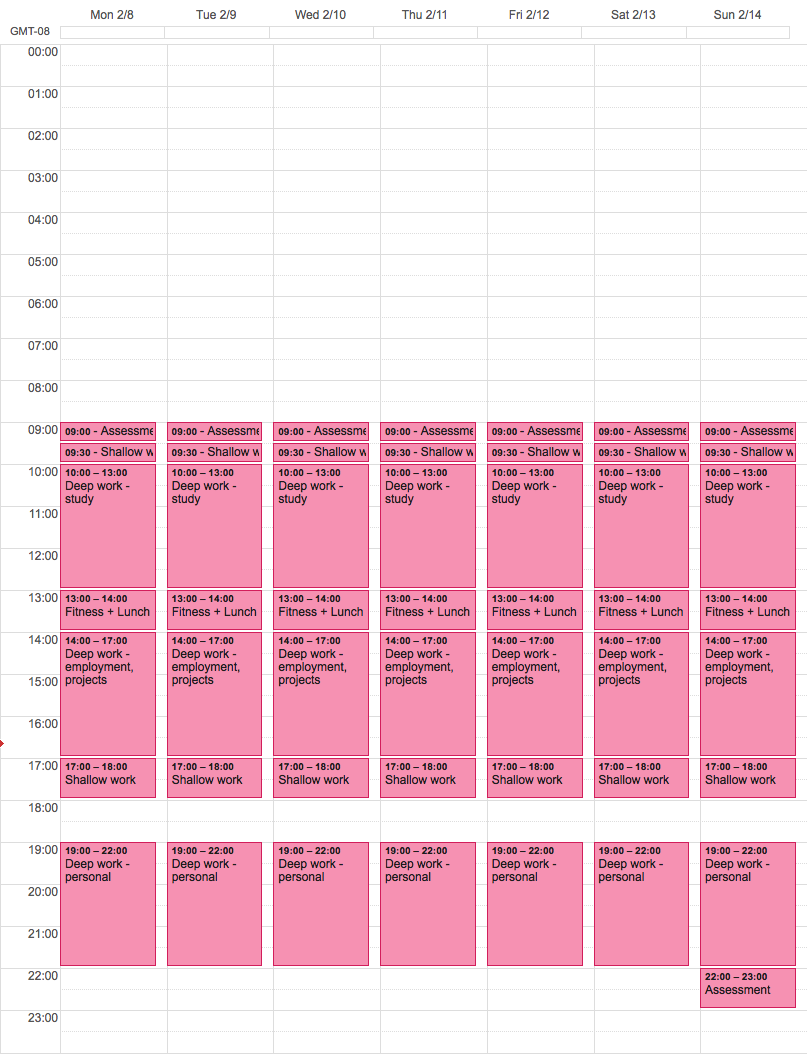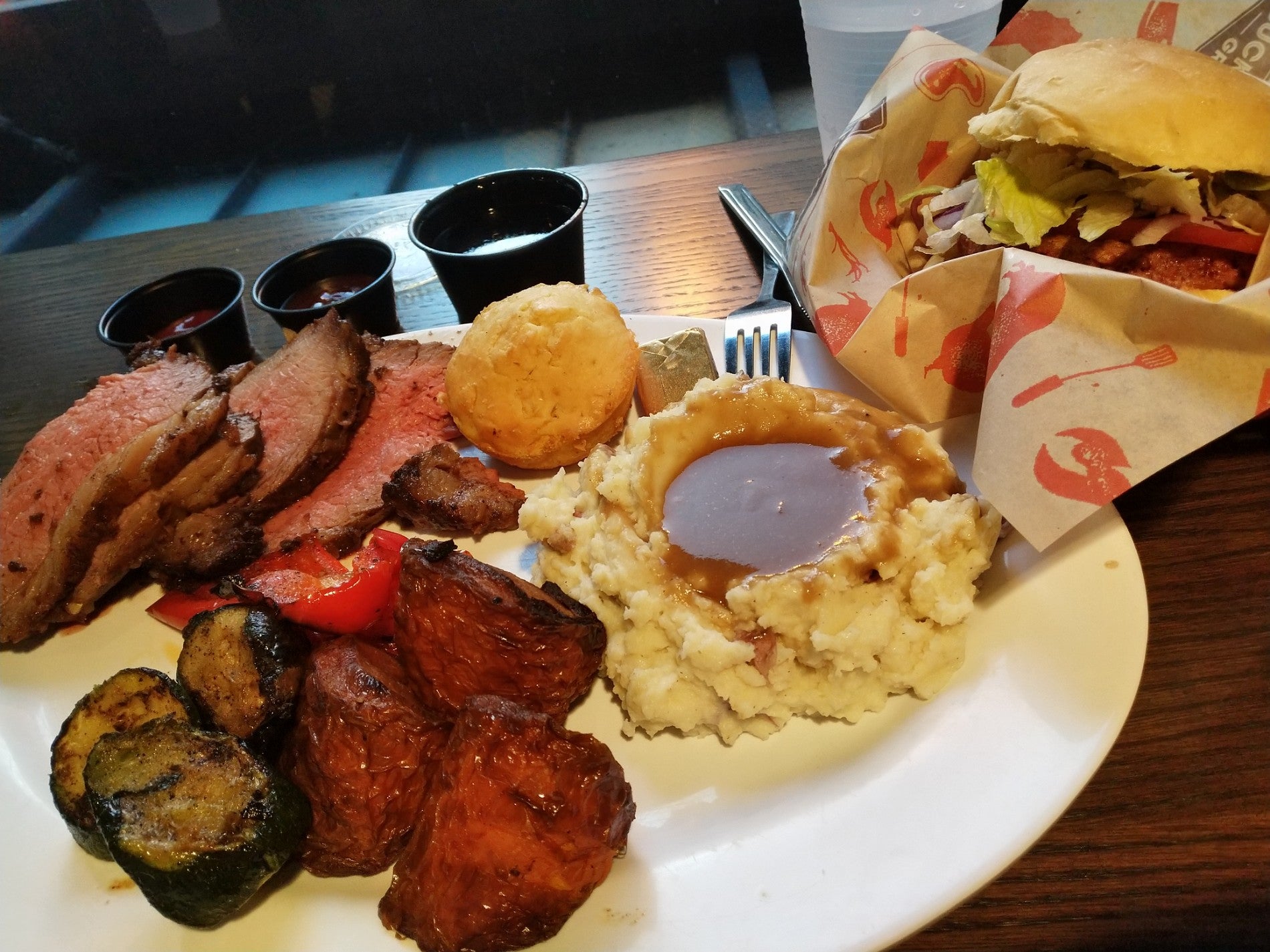First 12 week year underway
Since I finally separated from the seductively convenient employment I carried on for nearly five years, I now have some time to focus on myself. My back burner has long been stacked high, and some of those pots are surely rotten by now. If I can’t manage to sort through it now that I have the time, then I may truly be hopeless.
Most of my time the past month I spent on family time, personal organization, battling (or bungling) a fungus gnat infestation, building a hackintosh and reading a number of books. I don’t have any regrets, but I did think I’d have gotten more done by now, especially catching up on photos and journaling. I need to be sure I don’t become a victim of my own shifting viewpoint and justifications.
This past weekend I accompanied my friend Alejandro and his Stanford friends to a Tahoe cabin for some sledding, socializing and relaxation. I spent much of my time reading a chemistry textbook to refresh my memory and rereading Kristin Ohlson’s “The Soil Will Save Us” (2015), this time taking detailed notes. On the drive back, which took almost five hours again due to snow and ice and chain controls, I started reading “The 12 Week Year: Get More Done in 12 Weeks than Others Do in 12 Months” (Brian P. Moran and Michael Lennington, 2013). I picked it on a whim, and I expected it to be about business processes and being efficient. I had recently read “Flawless Consulting: A Guide to Getting Your Expertise Used” (Peter Block, 3rd ed., 2011), also on a whim, and I found it quite interesting and got some insight into how some of my past interactions could have been improved. So I figured another short whimsical choice would be fine.
Well, “The 12 Week Year” was very motivational.
Since listening to “The Power of Habit: Why We Do What We Do in Life and Business” (Charles Duhigg, 2014) over the course of a few runs in Tokyo, the need to establish some good habits has been weighing on me. My work hours were not necessarily rigid, and my mind is too good at convincing me to run tomorrow and have another dessert now. I knew I lacked routines, and I knew from “The Power of Habit” they ought to be easier to form and stick with than I previously imagined. But I think I used this slight relief as an excuse to wait just a bit longer.
In “The 12 Week Year”, you learn a bunch of reasons annual planning defeats its purpose in most cases due to the time frame being too long to accurately make predictions and focus on just a couple of things. The authors purport 12 weeks ought to be enough time to establish habits (in agreement with “The Power of Habit”) and make significant progress, but short enough to avoid all the problems with 12 month planning. They therefore argue you must think in terms of not years or even quarters, but totally independent, 12 week periods; your new “year”.
In order to be truly effective, though, the authors provide a slew of structures to hopefully ensure success. First you create a crazy optimistic life vision, based on your passions and highest aspirations. Your business vision must derive from your personal vision. From there, you create three year visions, and finally 12 week plans. You’re encouraged to aim for goals you might dismiss as being impossible, for once you start planning how you might achieve it, impossible becomes possible, then probable, and eventually, certain. You’re encouraged to imagine your vision often, employing recent brain science findings that thinking about outcomes and actions activates the exact neurons that would be activated in the real event, the same strategy by which Olympic athletes can improve their game simply by thinking about performing well.
Each 12 week plan is structured such that completing the objectives guarantees progress toward your ultimate vision. You focus on just a few or a single thing during each 12 weeks. Commitments are easier to get rolling, because you only have to commit for 12 weeks, not a year. You schedule blocks of uninterrupted time to work on these big goals. Measurement is emphasized, but surprisingly, it isn’t the results that you focus on, but rather “lead indicators”, which are essentially measures of whether you did what you said you would do, such as minutes run or hours studied. The idea is you score yourself on percentage of tasks accomplished, and aim to increase this percentage each week. Success in this is supposed to guarantee success in your ultimate vision. There’s a lot more to the book, but you get the idea.
Coincidentally, my brother Tim recently emailed the family about an Art of Manliness podcast he listened to featuring Cal Newport speaking about his recent book, “Deep Work: Rules for Focused Success in a Distracted World” (2016), which apparently somewhat builds on his previous book, “So Good They Can’t Ignore You: Why Skills Trump Passion in the Quest for Work You Love” (2012). Tim provided this helpful synopsis of the podcast to get us interested:
Humans are wired for focusing intensely over long periods of time (“deep work”). This is how meaningful things gets done—innovations, creative projects, etc. The thing is, today’s world fosters distraction rather than focus (notifications, always-on, instant-gratification expectations, etc.). So, being skilled at deep work has always been valuable, but today it is proportionally more valuable than ever. Economically, first of all, but also psychologically/personally: Engaging in deep work regularly improves life meaning, happiness and outlook. Few people practice this skill. If you practice this skill, you can outperform your competitors.
This seemed to overlap with “The 12 Week Year” quite a bit, but possibly has more emphasis on distraction, so I started listening to “Deep Work” also. Before the week escaped, though, I resolved to set up a 12 week plan. Since I am largely still trying to decide what direction I want to take my career, I had trouble coming up with a personal and professional vision, but I know I’ll be able to improve it over time. My top goal was to set up the schedule so I could get going on routine creation. I am mindful of the authors’ warnings to take the vision and planning seriously, so I will continue to think about it for sure.
I know I will get a new job eventually, so I planned such that a job could be swapped without ruining my established routines too much. Instead of labeling my blocks according to the suggested method and including specific tasks, I set up “deep work” and “shallow work” blocks, taking a cue from the deep work book. I’m aiming to work on studying and projects during the daytime deep work blocks, and work on personal things in the evening. At the start of the day, I’ll do some brain exercises, which currently includes BrainHQ, WaniKani and Khan Academy. I’m working fitness into my lunch block, but perhaps that will need to move to evening for longer runs. I’ll see how this goes!
For tracking, “The 12 Week Year” suggested tracking percentage of tasks completed. Since most of my work right now is hourly reading, research, etc., and again taking a cue from “Deep Work”, I am just going to track hours spent on key objectives. I’ll penalize myself some hours for things like drinking soda or perhaps eating poorly. I can work on this more later; most importantly I wanted to avoid any further postponements. So my basic tracking spreadsheet follows.
So far, I’ve already needed to make a few exceptions for an upset stomach and to squeeze in a appointments at the clinic and for repairmen, but I’m trying hard to stick with this. “The 12 Week Year” argues commitments aren’t things you do only when circumstances permit, but things you do no matter what. I need to not make too many exceptions based on just getting started, as those are what always preempt what could be great running streaks and more. At least now those failures will be reflected in my measurements.
Here’s to the next 12 weeks!
























